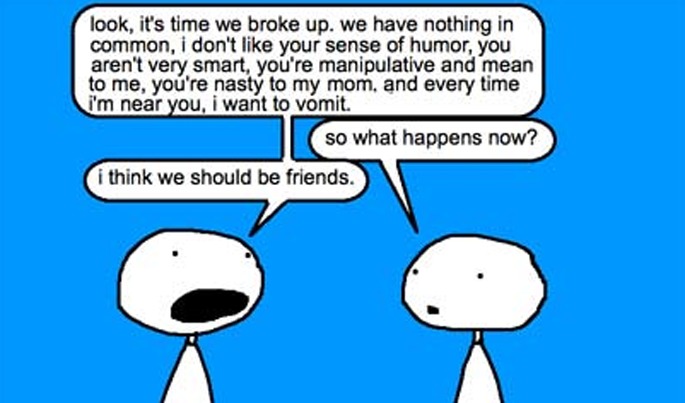It’s almost a dead cert that most of us have heard those four little words: “Let’s just be friends” spill out of a partner’s mouth, or even said it ourselves to a past girlfriend or boyfriend. Although one of you might be heartbroken, the attitude that friendship is better than nothing is one that many of us hold, at least in the first few days and weeks following a break-up. However, rarely is the situation as black and white as this. Do you think it is possible to develop a great friendship with an ex? Or do you think it comes with more emotional complications than ordinary friendship? Does it have to be all or nothing?
Moving on
When relationships end, there are bound to be hurt feelings and the general consensus among psychologists is that a period of time must be allowed to pass before you can even consider being friends. If there are still feelings from either side, then the friendship will not be a platonic one and will stall and if the motivating factor behind staying friends is the thought that one day you might win the other person back, then the friendship is over before it has even begun.
Research suggests that if our family and friends want us to be friends with an ex, you are more likely to do so. Those who had more people around facilitating the friendship reported higher levels of friendship quality with their previous partners.
Other points are also considered important when you’re braving the waters of a friendship, such as having boundaries, like not discussing new relationships or asking for relationship advice because as soon as you do that you’ll be back in the intimacy zone, which makes it harder to move on. And whatever happens, never ever sleep with an ex, as you’ll never move on. Relationships take time to build, so they will take time to disentangle and refigure.
Is there a lingering emotional attachment?
So if we establish a great friendship with an ex, can this have an effect on our subsequent relationships? More than we may think, according to one study in at the University of Toronto Canada. The Ex Factor is likely to be a bigger issue in most relationships than previously thought, with so-called ‘friendships’ with exes stopping current relationships from flourishing, or even worse, damaging them.
Conducted over three waves in six months, 123 women and men ranging from 18 to 56 reported their current relationship quality, emotional; attachment to their exes and the perceived quality of relationship alternatives. In those relationships that declined over time, increased attachment for an ex-partner played a significant role.
The lead author Stephanie Spielmann: “We’re showing that current relationships and past relationships are much more intertwined than research considers them; people generally understand that they’re related, but (science) has largely ignored that aspect. It was more than just looking for someone other than their current partner. There seemed to be something unique about an ex. People can actually draw on feelings for ex-partners when they need to feel validated.”
Social Media
Even if we aren’t traditionally friends with an ex, many of us stay in contact via sites like Facebook, in an attempt to show maturity and dignity. However, research has shown that this is an unwise move.
A study at Brunel University looked at whether on-going contact in the digital realm was the same as staying in touch in the real world when it comes to getting over a relationship. Surveying 464 active Facebook users, researchers studied how it habits online translate to recovery following a split.
According to the study, 33 per cent use Facebook to monitor the activities of their former romantic partners – and this exacerbates feelings of distress over a break-up or increases feelings of sexual desire.
Other Ex Factors
Most importantly to note is that every person and relationship is unique. Casual relationships that end after a few months are undoubtedly different to partners who have been together for years, who share mortgages or even a family.
Being friends ultimately depends on you, your ex and what went wrong in the first place. If you act with kindness and integrity in all your relationships, then you can’t go too far wrong.
Author: Brett Harding is the director of Lovestruck, a website dedicated to online dating and bringing people together.
Tweet



